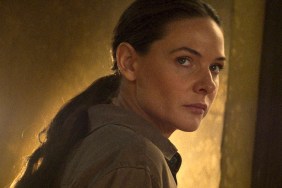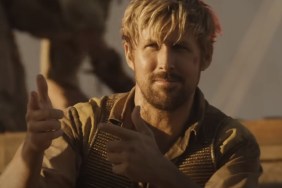Fans of Mark and Jay Duplass a.k.a. The Duplass Brothers probably have gotten used to their movies debuting at the Sundance Film Festival, their last one being the horror-comedy (of sorts) Baghead, and then Mark was back last year starring in Lynn Shelton’s popular breakout film Humpday.
Mark and Jay are back at Sundance with their third movie Cyrus, which they made with Fox Searchlight and well-known actors like John C. Reilly, Marisa Tomei, Catherine Keener and Jonah Hill, but they’re also involved with three other movies directed by various friends and acquaintances they’ve met on their journey to becoming respected indie filmmakers.
Bryan Poyser’s comedy Lovers of Hate, which is taking part in the festival’s Dramatic Competition, is probably the most accessible and polished of the three movies. It deals with a pair of competitive brothers, Rudy and Paul, played by Chris Doubek and Alex Karpovsky, the former unemployed and separated from his wife, played by Heather Kafka, and the latter, a successful author who takes advantage of their split by inviting Rudy’s wife to a Park City chalet where he’s been holed up to write his new book. When Rudy decides to pay a surprise visit to his younger brother, he finds out about the affair and starts to find ways to torment the two of them.
For your enjoyment, we have an EXCLUSIVE CLIP from Brian’s movie Lovers of Hate, one of the funnier scenes where Rudy tries to throw Paul off his scent when he starts to suspect something, which you can watch below. (You can also check out a special promo comic they did for the movie here.)
Linas Phillips’ Bass Ackwards is somewhat more esoteric and quirky, involving a road trip Linas takes from Seattle to New York in an old Volkswagen bus in order to escape a romance that has gone wrong; along the way, he encounters a lot of interesting characters that help him come to terms with decisions he needs to make. Phillips’ movie is also taking an innovative approach to distribution by bypassing theatrical altogether and debuting on Video on Demand and online on February 1, just a day after the festival ends.
The third movie, The Freebie, is the directorial debut by Kate Aselton, a regular in the Duplass’ movies (and Mark Duplass’ wife, as we learned), and it probably can be compared favorably to Humpday in that it involves a very high concept about a married couple, played by Aselton and comic Dax Sheppard, who decided they should have one day where they each can sleep with another person and get it out of their system, something that has repercussions, some obvious, others not so much. It may be the strongest of the three movies in terms of the maturity in the writing and acting, as well as the honesty in which it mixes humor and drama. It’s not the easiest movie to watch at the end where things blow up, but Aselton does a terrific job in all regards and Sheppard gives an almost shockingly strong performance. (The Freebie and Bass Ackwards are part of the festival’s NEXT section.)
ComingSoon.net has spoken with Mark Duplass a number of times before, both for Baghead and Humpday, so we got on the phone with him earlier this week to find out more about the brothers’ involvement with these three very different films, and also get a few tidbits about their own projects.
ComingSoon: First of all, is this the most movies you’ve ever had at Sundance at the same time?
Mark Duplass: Oh yeah, by far. I mean, obviously these aren’t all quote-unquote “our” movies. We were involved to lesser and bigger degrees on all of them, but yeah, definitely in terms of our names on movies, this is the first time I’ve had more than two.
CS: That must be really surreal. Was it just a coincidence that all of them ended up being done in time to get into this year’s Sundance and timing-wise, that’s how it worked out?
Duplass: I think that was a lot of it. I mean, honestly, Jay and I, since we made our studio movie, we actually made money this year, so we were able to give a little of money to these other movies. So that was a big part of it. It was just things like the more these cheap cameras start making really good-looking stuff, the easier it is to get ’em made and particularly at the right price. So we are basically committed to — any time we can help a little movie get made where we can we’re gonna do it.
CS: That’s cool and it must be a great place to be. Obviously you’re only on your third movie at this point, but there are all these great filmmakers out there who just can’t get their movies made because they’re waiting for the money and can’t do anything until it’s in place.
Duplass: That’s the worst feeling in the world, honestly, when you’re passionate about something and the only thing from keeping you from being able to do it is money. That just sucks basically. (Laughs)

CS: It’s kind of ironic, because you guys have gotten to the point where you actually have studios funding your movies now, but you’re also working with filmmakers who are in the place you were with “The Puffy Chair” years ago.
Duplass: Yeah, and to be honest with you, we got to make one studio movie, but that doesn’t mean we’re not kind of still in that place on some level. I mean, we made our first studio movie and I’m gonna make another one this spring, but we still have tons of movies that we think are appropriate to be done in the microbudget way and we’re still planning on making movies like that, too. There’s just something really invigorating and inspiring about pooling together your resources, everybody’s working for peanuts, and you’re all in it together. It’s very good for the soul.
CS: Absolutely. So let’s talk about some of these movies, starting with “Bass Ackwards.” How did you guys get involved with Linas? Was he somebody you knew who contacted you about helping to produce his movie?
Duplass: I worked with Linas on a movie “True Adolescents” that he and I both acted in. It was shot in Seattle. It was on the fest circuit last year. Our friend Thomas Woodrow had produced that. So I was up in Seattle, I think I was up there shooting “Humpday” or something like that. Linas and I were just hanging out at a bar, and he started telling me about this footage that he had been shooting with him on an alpaca farm and there was this VW bus that he wanted to buy on Craigslist and, this kind of bizarre, slightly funny, but dreamy road trip, you know? Linas is just a super-creative person. I just love his sensibility, love his style so immediately I go into producer mode. Even though Jay and I are writer/directors, we produced all of our first movies. So my brain starts going, “Oh my God, this would be a good movie to make, he absolutely should make this.” We spent the next couple of hours just having a beer and just trying to convince him that this was a movie he had to get made. Then I asked him, “How much money do you need to make it?” He kind of put out a number and that wasn’t a number that I could pay for myself, so I put him back in touch with Thomas Woodrow who I have watched produce “True Adolescents” and do a fantastic job on it. Then, those two pretty much just hit the ground running and then a year later, they send me a cut of the movie.
CS: How realistic are filmmakers who want to make a movie about the budget and how much it will cost? Are they very unrealistic about it?
Duplass: It’s definitely a case by case basis. Jay and I have always been very hard on young filmmakers and for better or for worse, our whole approach is “Do not ask for too much. Do not wait around. Don’t even write a script that you think costs too much.” You have to write something you could make, and you have to write something that’s budget-appropriate. So our advice is always basically if you want to make something and it’s your first movie, look around you, see what kinda cool sh*t you have in your bedroom and in your parents’ house, write that into the script, because they’re free props, and go from there.
CS: Cool. Now in all these cases, did they all have some kind of script written when you first got involved or did they just have an idea what they wanted to do?
Duplass: With the case of “Bass Ackwards” and Linas it was the conversation really. It was a feel of these things and just the sense I was getting from him was that he’s just an inspired dude. You know how sometimes you can hear somebody talking about a project and even though it’s not even there yet, you know it’s gonna work? So that one was clearly just basically an amoeba of an idea whereas with “Lovers of Hate” and Bryan Poyser, who is an old friend of ours from Austin. Actually, I used to PA and boom op for Bryan on all of his student films at the University of Texas ’cause I was like 15 or 16 and I was just with my brother who was there in the film school with them, and I learned a lot about story from him and his filmmaking partner at the time, Jacob Vaughn, who is now one of our editors on our movies – we all kinda stick together basically. Bryan doesn’t need us creatively. Bryan knows exactly what he’s doing. I think Bryan is one of the best unsung writers in the business and now he’s showing that he knows how to direct too. He came to me and Jay with the script early on. We gave him a couple of suggestions on it, but he didn’t need ’em really, he knows what he’s doing. He put together some money to go make the movie and then that was the case where he ran outta money halfway through, so Jay and I just took a bunch of the money that we had made on our studio job and threw it at him so he could finish the movie. Then from that point we kind of became involved there in helping him sculpt the edit towards the end a little bit, but again, with a very light-hand touch. He’s good and knows what he’s doing. Where we really came on is this incredibly beautiful, but terribly tragic, Bryan got the word that his movie got into Sundance and then two days later got the word that his father had just passed away.
CS: Oh man, wow.
Duplass: He was real busy dealing with that, so Jay and I who had been around the film sales and publicist thing, we just took the move around and helped launch it into Sundance in the right way.
CS: Very cool. “The Freebie” and “Lovers of Hate” are probably a little more–I hate to use the term–but high concept. I hate saying that, but they kind of are. How important is it these days for indie filmmakers to have that kind of mentality when they’re trying to get movies financed? It seems it would be easier for those movies.
Duplass: Yeah, I think it’s smart if you can, if it inspires you. I would never recommend someone to do something high concept just for the sake of doing a high concept idea. That being said, if you have one movie that has no concept and one movie that has a high concept and you’re trying to pick which one to make, do the high concept one! (chuckles) It’s gonna be better for you, you know? But yeah, I think those two movies are definitely more traditional narrative, more so than “Bass Ackwards,” which almost has this sort of dreamy, Kelly Reichardt “Old Joy” feel to it with a little bit of humor in there. I feel like “Lovers of Hate” and “Freebie” are much more examples of like, “Wow, these are filmmakers who are working in the microbudget spectrum, but if I pluck them and put them in Hollywood, their sense of story and comedy and sense of timing plays right in there.”
CS: Absolutely. Out of those three movies, Katie’s movie is the only one with a well-known actor in Dax Sheppard, which is interesting casting. How do things change when an actor doing movies and is about to star on a TV show gets involved. Is it harder to get them into the microbudget world way of thinking?
Duplass: Well, Dax was a special case ’cause he’s an incredible person. He’s super intelligent, super-sensitive. Jay and I had met with Dax about a year ago. I told him, and I was honest with him about it, at first I was like, “Okay, let’s meet with this guy. He likes our movies.” But I hadn’t seen anything from him on screen that made me think there’s something really special about this guy, but when I met with him I was like, “Woah, this guy is smart, he’s savvy, he’s sensitive, incredibly emotionally evolved for a person who was on “Punk’d.” So when we were putting together “Freebie” it was less about like, “Who can we get in there that’s a movie star?” He was the best person for the job. So he’s a friend of ours and moved to the neighborhood and he was pretty much one of us.
CS: As far as Katie, she’s been in the movies you’ve directed, so did she approach you guys to have you involved in the movie or how did that come about?
Duplass: Yeah, I mean, Katie’s my wife so…
CS: Oh, I didn’t realize that. Okay, well there you go.
Duplass: So there’s always that. I’ve really been encouraging Katie to make a movie for a while, because she’s a specific kind of actor, which is that she understands story very, very well and you can see it when you’re watching “The Puffy Chair.” She knows how to draw from the story, so I thought she could probably make a good movie. She wanted a good role for herself as an actor so when she came up with this idea, it was literally immediate, like within a week, we took a bunch of the money that each of us had made on different jobs, threw it into an account and we were shooting within a couple of months.
CS: How does it work out, being involved with these movies while at the same time you and Jay directing a bunch of your own movies? You’ve made two movies since we spoke last year, so how did you balance those with these three projects?
Duplass: It’s not as crazy as it sounds from the outside. I mean, we’re definitely busy, definitely working a lot of the time. Obviously having two writer/directors in me and Jay helps a lot because we could split up our duties here and there as needed. But, you know, for “Freebie,” I helped set the movie up, to help set the right tone and environment, the right budget levels, because I know how to do that stuff. But beyond that, the true creative forces in the movie were Katie, her producer Adele (Romanski), Benjamin (Kasulke) the DP, Nat Sanders the editor and Dax. Those guys were pretty much doing the movie. I was around to field questions and then to look at footage and cuts when they needed me, but it never felt like I was making two movies at the same time or an on-set every day kind of thing.
CS: This may be a hard question to answer, but out of you and Jay, does one of you like doing the production side of things better than the other, in terms of being involved with these other filmmakers? Do you both basically share the same viewpoint on how best to split the duties required?
Duplass: It’s hard to say. I mean, I have tended to gravitate a little bit more towards helping out with other productions and the way that happened is that I’m an actor as well. When I jumped onto “Humpday,” I realized I have something to offer her. As well as an actor, I know how these movies work. I tend to meet a lot more people because of that. So, I tend to be personality-wise just a little bit more producesorial. Jay and I, when we work together as a team our movies, I’m a little bit more heavy on the front-end of the films, more of the writing and producing and getting them together and setting them up on their feet. That’s kind of what I’m good at. Then, we direct together and that’s just a completely cool experience, and then Jay comes on at the end and takes the movie home. Jay and our editor Jake, that’s really where his skill sets come in. It’s that patience and that acumen to take a movie from 80 percent to 100 percent, you know? I feel like I’m really good at getting things from zero to 80 and then from there I need somebody like Jay, who can really take it to 100.

CS: That’s really cool. As one of the growing number of directing teams, you must get that question a lot, especially since one normally sees a director as being a singular vision behind a movie, something that’s hard to understand splitting up.
Duplass: Yeah, it’s absolutely a single vision, but it’s got different moving parts that get it there basically.
CS: I can’t wait to see “Cyrus.” I’m really excited for that, so do you have any idea when Fox Searchlight might release that yet?
Duplass: They don’t know yet. We have a bunch of different things that we’re talking about, you know? It’s sort of a science for Searchlight. They really know what they’re doing so we trust those guys.
CS: Having it at Sundance with a studio behind it must be great for you guys, because that’s one less thing you have to worry about.
Duplass: Oh man, you have no idea. Not having to sell our movie is just like… that means that I can drink that much more.
CS: Well, you’re working on so many other movies, helping them out, so that should keep you busy. That other movie you mentioned is that the one you’re doing with Jason Reitman?
Duplass: Exactly, yeah.
CS: That’s already written and ready to start shooting?
Duplass: It’s something that we’ve written and that we’re prepping right now and we’re going to direct and shoot in New Orleans in the spring.
CS: Cool. So what’s it been like working with Jason on that? He kind of comes from the same place where he started as a filmmaker and now he’s getting into producing other filmmakers.
Duplass: Yeah, I mean, the guy is brilliant and the guy is powerful and there is pretty much no one else you want on your team when you’re trying to make a somewhat sensitive, quirky indie movie inside the studio system. He is basically the greatest, I would say, “usherer” (Laughs) of mainstream indie film that you can get.
CS: Do you feel like there’s a very defined line between a mainstream indie film and just a normal indie film, and is there any way of knowing where that line is going to be?
Duplass: That’s something that you and I can sit together and write a 500-page treatise on, but if you get down to the bare bones of it, for me, in my experience, it’s higher quality video and famous people. (Laughs) That turns it into a mainstream indie as opposed to a regular indie.
CS: I guess so, but then you have something like “Once” which is completely not that.
Duplass: Yeah, although I would consider “Once” to be a breakout from the indie. It wasn’t designed that way. It was more of a chance that brought that thing into the world.
CS: Very cool. Have you been in touch with Lynn (director of “Humpday”) at all? Do you know if she’s doing something else anytime soon?
Duplass: Yeah, Lynn and I are talking about making another movie together at some point, because we really like working together. She’s definitely going through all the options, a lot of what Jay and I went through after we made “The Puffy Chair” which was our introduction to the studio system and where do I fit? How is it going to work for me if I try to make a big movie?
CS: What about the other movie you guys were doing that you put on the back burner for “Cyrus”? Have you had a chance to finish that up?
Duplass: Yeah, it’s called “The Do-Deca-Pentathalon” and I can’t talk about it right now, but we’re planning something very unique and interesting with the release of that movie. We had to put it on the back burner while we were doing “Cyrus,” but now that we’ve got a little bit of a break, we’re getting back to it, so you should hear something about that in the next month.
If you happen to be in Park City, Utah for the next week, you should try to catch Kate Aselton’s The Freebie, Brian Poyser’s Lovers of Hate and Cyrus while there. Furthermore, you’ll be able to see Linas Phillips’ Bass Ackwards in a variety of formats, including Video on Demand and online download starting on February 1.









